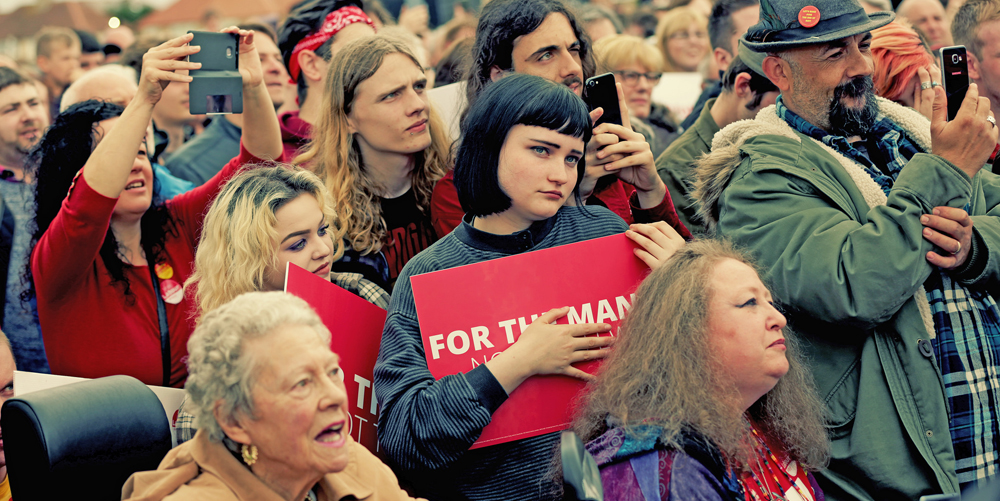Filling the vacuum
Labour’s right has been devoid of ideas for years and now needs to come up with a new philosophy, writes Philip Collins The two main political tribes are never more characteristically different than when they have just lost a general election....
Labour’s right has been devoid of ideas for years and now needs to come up with a new philosophy, writes Philip Collins
The two main political tribes are never more characteristically different than when they have just lost a general election. When the Conservatives lose, which they have now not done for 12 years, they do not indulge in much philosophical speculation about why. While not always explicitly blaming the electorate for being such damned fools, they do not usually regard the problem as demanding much in the way of inquiry. Just get better and win next time.
The Labour party greets every defeat with a gallery of half-remembered philosophy. It becomes all but impossible to leave the house without falling into a seminar in which a pious academic intones on why the electorate had no time for the something-or-other state and why this now needs to be replaced with a social democratic account of the politics of belonging. Or something like that. These days the same accounts are usually prefaced with the word ‘digital’. Digital solidarity, the digital enabling state.
Politics, as Ronald Reagan once said, is simple but not easy. The reason Labour loses elections is usually simple and usually the same. Not enough of the electorate trust the party with their money. It is important to remember, as the Labour party surveys the 2017 election in a mood of triumph and standing ovations for the leader, that it did actually lose. A truly terrible campaigning prime minister running the worst political operation in living memory did still win. If Tony Blair is excluded from historical memory, which seems to be the cherished ideal of many Labour party members, then Labour has not won a general election for 43 years. The campaign in 2017 hardly got round to the economy but it is hard not to think that Labour’s defeat was, in the end, due to the fact that not enough people regard Labour as economically credible.
Yet, for all that the post-mortem intellectual fiesta is usually rather indulgent, or for all that the simple explanation for a Labour defeat did just about hold, there is good reason this time for some philosophical reflection. The defeat for the Labour party in the election was nothing compared to the defeat of the Labour right within the party. Those MPs who have withheld their confidence from their leader Jeremy Corbyn went into the 2017 campaign with an argument that, frankly, made no sense. Vote for me, not for a Labour government, they said. Vote for me safe in the knowledge that Jeremy Corbyn cannot be prime minister and hell will freeze over before John McDonnell is chancellor of the exchequer. Their slippery argument almost came undone and now, rather than simply fold, the right of the Labour party needs to do some serious thinking.
The right of the Labour party is in this fix precisely be- cause, ever since the crash of 2008, it has been intellectually empty. Rudderless and without ideas, the right has relinquished the principle of hope to the left. Mr Corbyn might, to those of us who have watched him for a long time, be the most unlikely beneficiary of a cult of optimism but he is and the right of the Labour party cannot look elsewhere for the blame. Since the Labour party fell out of love with New Labour nothing new has arisen to take its place. Nobody has been able to answer the question of what a viable Labour government would look like in a nation that is still running an annual deficit. Mr Corbyn’s answer is to ignore the problem and throw money like confetti. Even if he succeeds in finding his way to power with such an irresponsible series of spending commitments, the sheer folly of his programme would not be long in being disclosed. The Labour party has to be able to do better than this and, to do so, it is going to have to start thinking.
The nearest that anyone has come to philosophical re- newal in the Labour party after Blair was the brief moment that a coalition between New and Blue Labour seemed possible. It already seems like ancient history but there was an attempt to corral James Purnell and Jon Cruddas together in an alliance to lead the party in 2010. The pair of them got on well and the philosophical marriage, although it might seem an arrangement of opposites at first, had a lot to commend it. The Gordon Brown view of the Labour party was, essentially, that equality could be engineered through a series of state programmes and giveaways through the tax system. It placed a huge reliance on the largesse and the benign capacity of the state. New and Blue Labour advocates shared an analysis that this could never work, even if it were ever desirable. They both had a respect for the sanctity and indigenous nature of liberty. They were both expressly patriotic. There were differences too, of course. New Labour was internationalist and Blue Labour was not. New Labour liked to stress the freedoms and prosperity of markets, Blue Labour made a point of their deficiencies. But the basic shared approach to politics promised a coalition within the Labour party that would have been both new, in political terms, and philosophically intriguing.
It still would. It would be a party that stressed the importance of work, earning and contribution. The quality of work, as well as the availability of work, would be a big concern. The century-long shift in the welfare state from a principle of contribution to a principle of need would be reversed. Those who had earned what they had would be favoured over those who had not earned it. The objective of public policy would be to improve and extend self government so that people could live their life as they wish. Power should flow to the places people live so that they can shape their homes as they wish them to be. There is a lot to fill in but there is the outline there of a philosophical approach that is both rooted in the nation and looking out beyond its borders.
There is no sign of any of this in the current Labour party. For an organisation which has captured the sense of optimism among the young it remains curiously bereft of intelligent thought. Mr Corbyn’s ideas on domestic policy, such as he has any at all, were stale when he first thought of them 40 years ago. Labour is not really analysing Britain with any profundity, still less coming to serious conclusions about a solution. It may be that there is a path to government that requires no further reflection – after all the Tories seem to find one – but there is no path that does not loop back on itself. No government that arrives in power with nothing coherent to say will last long.
The Labour party is, at the time of writing, triumphant in defeat but intellectually incoherent. Taking the energy companies into public control is a solution in search of a problem, or ideology in search of something to do. The right of the Labour party does need to make it clear that it will not countenance such nonsense but it can only do that if it has an alternative prospectus to put in its place. The relevant analogy may yet come from France where, in 1981, President Mitterrand came to power with an avowedly left-wing programme for government but quickly realised that it was impossible to carry it out. He had to quickly revise his plans. The task for the Labour right is to be ready with that prospectus when the moment of need arrives, for it undoubtedly will. I say this not as an invitation to hostility. Mr Corbyn has earned the right to lead as he wishes and, if the Conservative government continues to show the capacity for self-destruction that it has managed since 2015, he may lead the party all the way. Perhaps the upshot of this thinking will be to supply a programme for government in a moment of crisis.
But it may be that such a programme will be needed anyway. There is a hole in British politics where a coherent left-of-centre prospectus ought to be. Whether that set of ideas is then put at the service of a Labour party which once again wants such a thing, or whether it is put at the service of a new entity, is a question for another day. But one truth remains in the ashes of many of the assumptions of politics that held until June 2017. Britain is a divided country but it is not yet an extreme country. If the choice on offer is a Tory government beholden to the ideologically-fixated on its right and a Labour government led by its left, then the vote has to go somewhere. But, with the huge exception of the cavalry of Corbyn’s new voters, there is no reason to suppose this vote has split right and left with great enthusiasm. There is a vacancy in the middle. The first thing to put in the middle is a philosophy.

